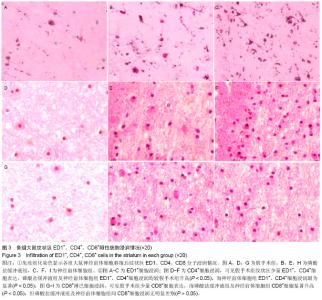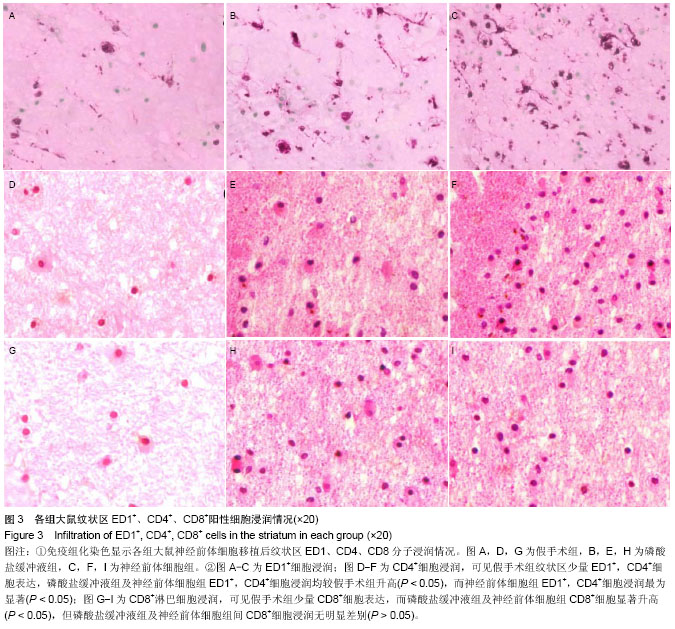Chinese Journal of Tissue Engineering Research ›› 2014, Vol. 18 ›› Issue (14): 2191-2199.doi: 10.3969/j.issn.2095-4344.2014.14.010
Previous Articles Next Articles
Transplantation immunity phenomena after embryonic stem cell-derived neural progenitor cells are grafted into ischemic rat brain
Mei Ai-nong1, Zhang Su-ming2
- 1Department of Cadre, Provincial Clinical College, Fujian Medical University, Fujian Institute of Clinical Geriatrics, Fujian Provincial Hospital Key Laboratory of Geriatrics, Fuzhou 350001, Fujian Province, China; 2Department of Neurology, Tongji Hospital, Tongji Medical College, Huazhong University of Science and Technology, Wuhan 430030, Hubei Province, China
-
Received:2014-02-07Online:2014-04-02Published:2014-04-02 -
Contact:Zhang Su-ming, M.D., Chief physician, Professor, Doctoral supervisor, Department of Neurology, Tongji Hospital, Tongji Medical College, Huazhong University of Science and Technology, Wuhan 430030, Hubei Province, China -
About author:Mei Ai-nong, M.D., Associate chief physician, Department of Cadre, Provincial Clinical College, Fujian Medical University, Fujian Institute of Clinical Geriatrics, Fujian Provincial Hospital Key Laboratory of Geriatrics, Fuzhou 350001, Fujian Province, China
CLC Number:
Cite this article
Mei Ai-nong, Zhang Su-ming. Transplantation immunity phenomena after embryonic stem cell-derived neural progenitor cells are grafted into ischemic rat brain[J]. Chinese Journal of Tissue Engineering Research, 2014, 18(14): 2191-2199.
share this article
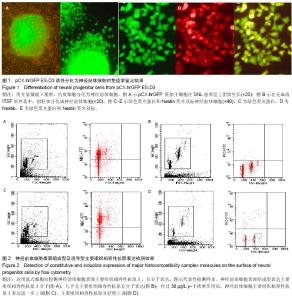
2.1 实验动物数量分析 纳入18只SD大鼠,随机分为3组,全部进入结果分析,无脱失。2.2 pCX-hrGFP ES-D3 胚胎干细胞向神经前体细胞诱导分化 pCX-GFG转染的ES-D3细胞在滋养层上形成圆形细胞团(图1A)。撤销滋养层后单细胞胚胎干细胞悬浮培养后形成大小不等的拟胚体。拟胚胎在无血清培养基中逐渐分化,小的类圆形细胞逐渐从周边溢出(图1B),并逐渐分化成类神经前体细胞(图1C)。常规消化后这些细胞在碱性成纤维细胞生长因子条件下保持扩增能力,并倾向于集落生长,Nestin荧光染色显示双标阳性率为74%以上(图1C-E),表明经pCX-hrGFP 转染的ES-D3能稳定表达绿色荧光蛋白并在传代和诱导分化中保持荧光的稳定性。"
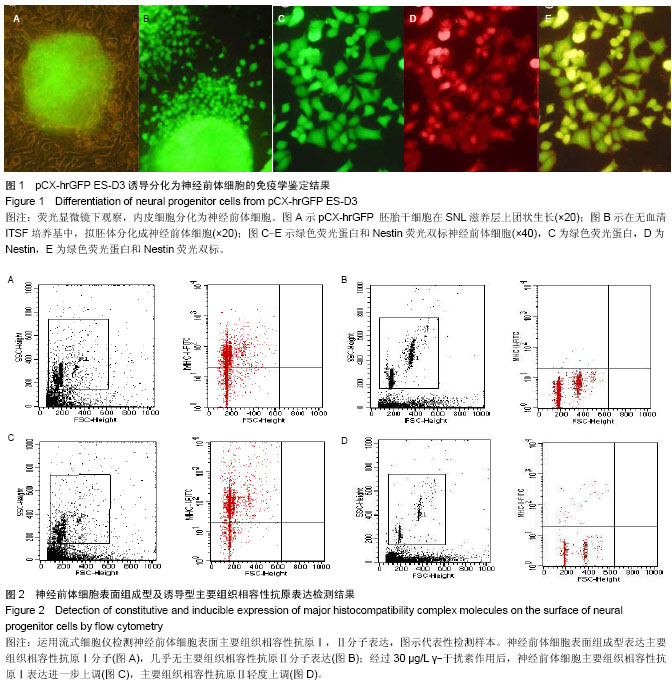
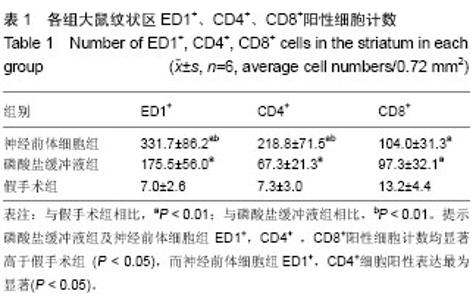
2.3 神经前体细胞表面主要组织相容性抗原Ⅰ,Ⅱ表达情况 神经前体细胞表面主要组织相容性抗原Ⅰ类分子高表达(74.37±18.23,图2A),主要组织相容性抗原Ⅱ几乎无表达(0.39±0.02,图2B)。经过γ-干扰素诱导后,神经前体细胞主要组织相容性抗原Ⅰ类分子表达上调(85.09±21.45,图2C),主要组织相容性抗原Ⅱ表达轻度上调(5.30±0.01,图2D)。 2.4 ED1、CD4、CD8阳性细胞免疫组织化学检测ED1+细胞:假手术组大鼠纹状区可见少量散在ED1+细胞(7.0±2.6,图3A),为正常存在的固定小胶质细胞。而磷酸盐缓冲液组(175.5±56.0,图3B)及神经前体细胞组(331.7±86.2,图3C)ED1+细胞显著升高(P < 0.01),提示缺血本身导致ED1+细胞的浸润。组间比较提示神经前体细胞组与磷酸盐缓冲液组表达差异亦有显著性意义(P < 0.01),神经前体细胞组纹状区内ED1+细胞表达明显升高,提示神经前体细胞激活局部免疫反应(表1)。"
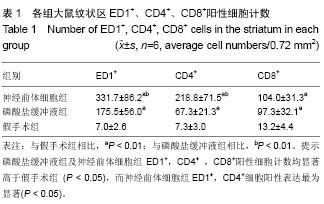
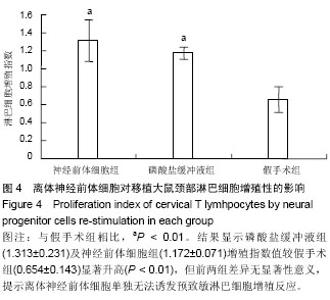
CD4+淋巴细胞:假手术组大鼠散在少量CD4+淋巴细胞(7.3±3.0,图3D)。而磷酸盐缓冲液组(67.3±21.3,图3E)及神经前体细胞组(218.8±71.5,图3F)均表现强烈的CD4+淋巴细胞浸润(P < 0.01),提示脑缺血损伤可导致CD4+淋巴细胞反应。组间比较显示,神经前体细胞组具最高CD4+淋巴细胞浸润,说明存在针对神经前体细胞的CD4+淋巴细胞反应(P < 0.01,表1)。 CD8+淋巴细胞:假手术组大鼠纹状区可见少量CD8+淋巴细胞(13.2±4.4,图3G)。而磷酸盐缓冲液组(97.3± 32.1,图3H)及神经前体细胞(104.0±31.3,图3I)则均见显著CD8+淋巴细胞浸润(P < 0.01,表1),但磷酸盐缓冲液组、神经前体细胞组间差异无显著性意义(P > 0.05,表1)。 2.5 离体神经前体细胞对移植大鼠颈部淋巴细胞增殖性的影响 离体神经前体细胞与移植神经前体细胞2周后大鼠颈部淋巴细胞共培养,磷酸盐缓冲液组(1.313±0.231) 及神经前体细胞组(1.172±0.071)增殖指数值较假手术组(0.654±0.143)显著升高(P < 0.01),提示脑损伤后内源性抗原是诱发局部淋巴细胞反应的主要因素。神经前体细胞组虽较磷酸盐缓冲液组有更高的增殖指数值,但二者之间差异无显著性意义(P > 0.05),提示离体神经前体细胞单独无法诱发预致敏淋巴细胞增殖反应(图4)。"
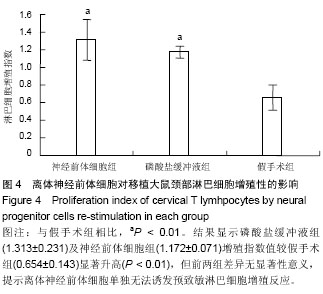
| [1] Bonnamain V, Neveu I, Naveilhan P. Neural stem/progenitor cells as promising candidates for regenerative therapy of the central nervous system. Front Cell Neurosci. 2012;6:17. [2] Bonnamain V, Neveu I, Naveilhan P.In vitro analyses of the immunosuppressive properties of neural stem/progenitor cells using anti-CD3/CD28-activated T cells. Methods. 2011; 677: 233-243. [3] Klassen H,Schwartz MR, Bailey AH, et al. Surface markers expressed by multipotent human and mouse neural progenitor cells include tetraspanins and non-protein epitopes. Neurosci. Lett. 2001;312:180-182. [4] Hori J, Ng TF, Shatos M, et al. Neural progenitor cells lack immunogenicity and resist destruction as allografts. Stem Cells. 2003;21:405-416. [5] Odeberg J,Piao JH,Samuelsson EB,et al. Low immunogenicity of in vitro-expanded human neural cells despite high MHC expression. J.Neuro Immunol. 2005;161: 1-11. [6] Fändrich F, Dresske B, Bader M, et al.Embryonic stem cells share immune-privileged features relevant for tolerance induction. J Mol Med. 2002;80:343-350. [7] Zappia E,Casazza S,Pedemonte E,et al.Mesenchymal stem cells ameliorate experimental autoimmune encephalomyelitis inducing T-cell anergy. Blood.2005;106: 1755-1761. [8] Einstein O, Fainstein N, Vaknin I, et al.Neural precursors attenuate autoimmune encephalomyelitis by peripheral immunosuppression. Ann.Neurol. 2007;61:209-218. [9] Einstein O,Karussis D,Grigoriadis, N,et al. Intra ventricular transplantation of neural precursor cells pheres attenuates acute experimental allergic encephalomyelitis. Mol Cell Neurosci. 2003;24:1074-1082. [10] Cusimano M,Biziato D,Brambilla E, et al.Transplanted neural stem/precursor cells instruct phagocytes and reduce secondary tissue damage in the injured spinal cord. Brain. 2012;35(Pt.2):447-460. [11] Sergent-Tanguy S,Véziers J, Bonnamain V,et al. Cell surface antigens on rat neural progenitors and characterization of the CD3 (+)/CD3 (-) cell populations. Differentiation. 2006;74: 530-541. [12] Johansson S, Price J, Modo M. Effect of inflammatory cytokines on major histocompatibility complex expression and differentiation of human neural stem/progenitor cells. Stem Cells. 2008;26:2444-2454. [13] Laguna Goya R,Busch R,Mathur R, et al.Human fetal neural precursor cells can up-regulate MHC class I and class II expression and elicit CD4 and CD8 T cell proliferation. Neurobiol Dis. 2011;41:407-414. [14] Carpentier PA, Palmer TD. Immune Influence on Adult Neural Stem Cell Regulation and Function. Neuron. 2009;64(1): 79-92. [15] 吴旋,黎海蒂,李树浓,等.小鼠胚胎干细胞体外分化为神经前体细胞的研究[J].第三军医大学学报,2001,23(11):1260-1263. [16] Longa EZ, Weinstein PR, Carlson S, et al.Reversible middle cerebral artery occlusion without craniectomy in rats. Stroke. 1989;20(1):84-91. [17] 龚非力.医学免疫学[M].北京:科学出版社,2000. [18] Frank MG, Barrientos RM, Biedenkapp JC, et al. mRNA up-regulation of MHC II and pivotal pro-inflammatory genes in normal brain aging. Neurobiol Aging. 2006;27(5):717-722. [19] Lawrence JM, Morris RJ, Wilson DJ, et al. Mechanisms of allograft rejection in the rat brain. Neuroscience. 1990;37: 431-462. [20] Nicholas MK, Stefansson K, Antel JP, et al. An in vivo and in vitro analysis of systemic immune function in mice with histologic evidence of neural transplant rejection. J Neurosci Res. 1987;18:245-257. [21] Taylor CJ, Bolton EM,Bradley JA.Immunological considerations for embryonic and induced pluripotent stem cell banking. Phil Trans R Soc B. 2011;366:2312-2322. [22] Drukker M, Katz G, Urbach A, et al. Characterization of the expression of MHC proteins in human embryonic stem cells. Proc Natl Acad Sci USA. 2002;99:9864-9869. [23] Strom TB, Field LJ, Ruediger M. Allogeneic stem cells, clinical transplantation and the origins of regenerative medicine. Curr Opin Immunol. 2002;14:601-605. [24] Zavazava N.Immunity of embryonic stem cell-derived hematopoietic progenitor cells. Semin Immunopathol. 2011; 33(6):613-617. [25] Boyd AS, Wood KJ. Characteristics of the early immune response following transplantation of mouse ES cell derived insulin-producing cell clusters. PLoS One. 2010; 5:e10965. [26] Jacobs SA, Roobrouck VD, Verfaillie CM,et al. Immunological characteristics of human mesenchymal stem cells and multipotent adult progenitor cells. Immunol Cell Biol. 2013;91: 32-39. [27] Nimer A, Wennersten F, Holmin A, et al. MHC expression after human neural stem cell transplantation to brain contused rats,Neuroimmunology. 2004;15(12):1871-1875. [28] McLaren FH, Svendsen CN, Van der Meide P, et al. Analysis of neural stem cells by flow cytometry: cellular differentiation modifies patterns of MHC expression. J Neuroimmunol. 2001; 112:35-46. [29] Modo M, Mellodew K, Rezaie P. In vitro expression of major histocompatibility class I and class II antigens by conditionally immortalized murine neural stem cells. Neurosci Lett. 2003; 337:85-88. [30] Chiu AY, Rao MS. Cell-Based Therapy for Neural Disorders -Anticipating Challenges.Neurotherapeutics. 2011;8:744-752. [31] Nicoleau C, Viegas P, Peschanski M,et al.Human Pluripotent Stem Cell Therapy for Huntington’s Disease: Technical, Immunological, and Safety Challenges.Neurotherapeutics. 2011;8:562-576. [32] Bakay RAE, Boyer KL, Freed CR, et al. Immunological responses to injury and grafting in the central nervous system of nonhuman primates. Cell Transplant. 1998;7:109-120. [33] Litchfield TM, Whiteley SJO, Yee KT, et al, Characterization of the immune response in a neural xenograft rejection paradigm. J Neuroimmunol. 1997;73:135-144. [34] Pederson EB, Zimmer J, Finsen B. Triple immunosuppression protects murine intracerebral hippocampal xenografts in adult rat hosts: Effects on cellular infiltration, major histocompatibility complex antigen induction and blood–brain barrier leakage. Neuroscience. 1997;78: 685-701. [35] Brevig T, Holgersson J, Widner H. Xenotransplantation for CNS repair: Immunological barriers and strategies to overcome them. Trends Neurosci. 2000;23: 337-344. [36] Poltorak M, Freed WJ. Immunological reactions induced by intracerebral transplantation: evidence that host microglia but not astroglia are the antigen-presenting cells. Exp Neurol. 1989; 103: 222-233. [37] 雷万龙,袁群芳,冯志博.大鼠脑缺血区局部炎症和细胞免疫反应的研究[J]. 中华神经科杂志,2001,34(5):276-279. [38] 陈玉社,公丕欣,夏作理.脑淋巴引流与神经免疫[J].中国微循环, 2003,7(4):254-256. [39] 梅爱农,张苏明,常丽英,等.鼠胚胎干细胞及其衍生神经前体细胞的免疫原性检测[J].神经损伤与功能重建,2008,3(5):307-309. [40] Ma MC, Ding SL,Lundqvist A,et al.Major Histocompatibility Complex-I Expression on Embryonic Stem Cell-Derived Vascular Progenitor Cells Is Critical for Syngeneic Transplant Survival. Stem Cells. 2010;28(9):1465-1475. [41] Bifari F, Pacelli L, Krampera M. Immunological properties of embryonic and adult stem cells. World J Stem Cells. 2010; 2(3):50-60. [42] Drukker M, Katchman H, Katz G, et al. Human embryonic stem cells and their differentiated derivatives are less susceptible to immune rejection than adult cells. Stem Cells. 2006;24:221-229. [43] Bonde S, Chan KM, Zavazava N. ES-Cell derived hematopoietic cells induce transplantation tolerance. PLoS ONE. 2008;3:e3212. |
| [1] | Pu Rui, Chen Ziyang, Yuan Lingyan. Characteristics and effects of exosomes from different cell sources in cardioprotection [J]. Chinese Journal of Tissue Engineering Research, 2021, 25(在线): 1-. |
| [2] | Lin Qingfan, Xie Yixin, Chen Wanqing, Ye Zhenzhong, Chen Youfang. Human placenta-derived mesenchymal stem cell conditioned medium can upregulate BeWo cell viability and zonula occludens expression under hypoxia [J]. Chinese Journal of Tissue Engineering Research, 2021, 25(在线): 4970-4975. |
| [3] | Zhang Xiumei, Zhai Yunkai, Zhao Jie, Zhao Meng. Research hotspots of organoid models in recent 10 years: a search in domestic and foreign databases [J]. Chinese Journal of Tissue Engineering Research, 2021, 25(8): 1249-1255. |
| [4] | Hou Jingying, Yu Menglei, Guo Tianzhu, Long Huibao, Wu Hao. Hypoxia preconditioning promotes bone marrow mesenchymal stem cells survival and vascularization through the activation of HIF-1α/MALAT1/VEGFA pathway [J]. Chinese Journal of Tissue Engineering Research, 2021, 25(7): 985-990. |
| [5] | Shi Yangyang, Qin Yingfei, Wu Fuling, He Xiao, Zhang Xuejing. Pretreatment of placental mesenchymal stem cells to prevent bronchiolitis in mice [J]. Chinese Journal of Tissue Engineering Research, 2021, 25(7): 991-995. |
| [6] | Liang Xueqi, Guo Lijiao, Chen Hejie, Wu Jie, Sun Yaqi, Xing Zhikun, Zou Hailiang, Chen Xueling, Wu Xiangwei. Alveolar echinococcosis protoscolices inhibits the differentiation of bone marrow mesenchymal stem cells into fibroblasts [J]. Chinese Journal of Tissue Engineering Research, 2021, 25(7): 996-1001. |
| [7] | Fan Quanbao, Luo Huina, Wang Bingyun, Chen Shengfeng, Cui Lianxu, Jiang Wenkang, Zhao Mingming, Wang Jingjing, Luo Dongzhang, Chen Zhisheng, Bai Yinshan, Liu Canying, Zhang Hui. Biological characteristics of canine adipose-derived mesenchymal stem cells cultured in hypoxia [J]. Chinese Journal of Tissue Engineering Research, 2021, 25(7): 1002-1007. |
| [8] | Geng Yao, Yin Zhiliang, Li Xingping, Xiao Dongqin, Hou Weiguang. Role of hsa-miRNA-223-3p in regulating osteogenic differentiation of human bone marrow mesenchymal stem cells [J]. Chinese Journal of Tissue Engineering Research, 2021, 25(7): 1008-1013. |
| [9] | Lun Zhigang, Jin Jing, Wang Tianyan, Li Aimin. Effect of peroxiredoxin 6 on proliferation and differentiation of bone marrow mesenchymal stem cells into neural lineage in vitro [J]. Chinese Journal of Tissue Engineering Research, 2021, 25(7): 1014-1018. |
| [10] | Zhu Xuefen, Huang Cheng, Ding Jian, Dai Yongping, Liu Yuanbing, Le Lixiang, Wang Liangliang, Yang Jiandong. Mechanism of bone marrow mesenchymal stem cells differentiation into functional neurons induced by glial cell line derived neurotrophic factor [J]. Chinese Journal of Tissue Engineering Research, 2021, 25(7): 1019-1025. |
| [11] | Duan Liyun, Cao Xiaocang. Human placenta mesenchymal stem cells-derived extracellular vesicles regulate collagen deposition in intestinal mucosa of mice with colitis [J]. Chinese Journal of Tissue Engineering Research, 2021, 25(7): 1026-1031. |
| [12] | Pei Lili, Sun Guicai, Wang Di. Salvianolic acid B inhibits oxidative damage of bone marrow mesenchymal stem cells and promotes differentiation into cardiomyocytes [J]. Chinese Journal of Tissue Engineering Research, 2021, 25(7): 1032-1036. |
| [13] | Guan Qian, Luan Zuo, Ye Dou, Yang Yinxiang, Wang Zhaoyan, Wang Qian, Yao Ruiqin. Morphological changes in human oligodendrocyte progenitor cells during passage [J]. Chinese Journal of Tissue Engineering Research, 2021, 25(7): 1045-1049. |
| [14] | Wang Zhengdong, Huang Na, Chen Jingxian, Zheng Zuobing, Hu Xinyu, Li Mei, Su Xiao, Su Xuesen, Yan Nan. Inhibitory effects of sodium butyrate on microglial activation and expression of inflammatory factors induced by fluorosis [J]. Chinese Journal of Tissue Engineering Research, 2021, 25(7): 1075-1080. |
| [15] | Wang Xianyao, Guan Yalin, Liu Zhongshan. Strategies for improving the therapeutic efficacy of mesenchymal stem cells in the treatment of nonhealing wounds [J]. Chinese Journal of Tissue Engineering Research, 2021, 25(7): 1081-1087. |
| Viewed | ||||||
|
Full text |
|
|||||
|
Abstract |
|
|||||
